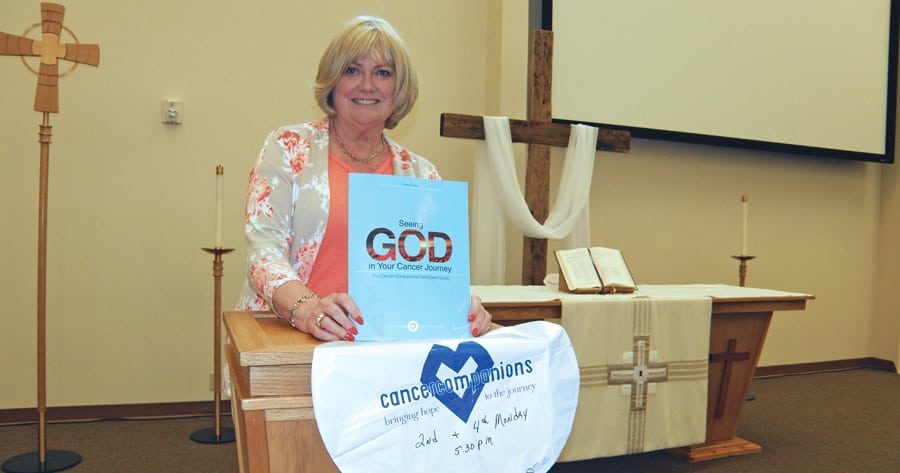
Home » Kennewick church launches new Christian-based cancer support group
Kennewick church launches new Christian-based cancer support group

July 14, 2017
A cancer diagnosis can make patients and their loved ones question their faith.
But a new program at a Kennewick church is reminding those affected by the disease that God plays a larger role.
“A person needs to be reminded of that — that God is bigger than their cancer,” said Marilou DeWoody, Bethlehem Lutheran Church’s ministry coordinator.
DeWoody helped to launch the state’s first Cancer Companions program at the church in January.
The Christian-based support group is for people undergoing treatment or who have had treatment in the past, as well as cancer caregivers and loved ones.
Participants in the free nine-session program receive a workbook and meet twice a month. At each session, they pray, watch a video and review the workbook together. For those who don’t think a group session is for them, private one-on-one sessions also are available.
DeWoody said starting up the program at Bethlehem Lutheran was “a God thing.” She walked into a church seminar to catch up with a friend at a conference in Phoenix without a second thought about the session’s topic, which happened to be Cancer Companions.
First came the shivers. Then the calling. And eventually, a new program for her church.
To become a trained Cancer Companion, volunteers undergo several hours of training.
Lynn Moate, 69, of Richland, volunteered for the training as soon as she “saw they were trying to get this program going,” she said. She’s been a member of Bethlehem Lutheran since 1965.
“I’ve experienced so many family members with cancer and it’s just what drew me there,” she said, explaining her 37-year-old daughter died from cancer, a sister died from ovarian cancer at age 55, another sister is a 10-year breast cancer survivor and another is a lung cancer survivor. She also recently lost her son-in-law at age 44 from cancer treatment complications.
“Hearing that God is bigger than your cancer is very helpful to me,” she said. “It’s OK to voice your anger to God. He already knows anyway. I was so angry after my daughter died and reading some of the Psalms where the Psalmists rage out at God for different things they’re going through, helped me. You may as well just voice it.”
Participating in the Cancer Companions program also is very personal for Lee Pearson, 68, of Kennewick. Her husband was diagnosed in February 2016 with multiple myeloma, a bone marrow cancer.
“For the longest time, I had to hold my breath with my husband…it was such a strain not to say anything for so long and to finally get to meet other people to talk about it. … We all have to deal with it and it’s good to deal with it.”
Pearson, who has been a member of Bethlehem Lutheran since 2005, said the program’s workbook “just takes my breath away.”
“I do love the support I’m getting there and things I’m learning … When you read some of these stories and some of the verses that go with them, it’s like your light comes on: this did happen but I was too stressed out to even see it was even affecting me,” she said.
Karen Tripp, a licensed marriage and family therapist developed the Missouri-based program after working with a cancer center in St. Louis. Her first support group began in 2011 and the program grew quickly from there, from one church to 12 churches within the first year.
The program runs on a shoestring budget of $70,000 a year with a staff of 24 in 21 states.
Tripp said the Christian-based group is needed as mainstream cancer treatment clinics typically don’t “like talking about Jesus” and “because of that, people who want to, aren’t comfortable in them.”
Churches also need such programs, Tripp said, explaining that all too often laypeople don’t know how to help families and patients cope with cancer.
“Cancer has a tendency to slip through the cracks. The manpower in every church — I would say no matter how big or how small — is not enough to care for the pastoral needs of the church,” she said, explaining the focus is on visiting members in the hospital and those who are homebound and can’t come on Sundays to receive communion. “Where does cancer fit into that? It doesn’t.”
Tripp said it’s not always obvious when someone is undergoing cancer treatment as many patients continue to go to work and church — until the disease takes a turn for the worse. “That can happen in days or weeks and then they’re in hospice. Then the church shows up at hospice time. The family then looks at the church and says, ‘Where have you been?’”
Churches play a key role in Cancer Companions by paying for starter kits and training.
The cost to train a person is $110 and a minimum of three must attend. Workbooks cost $16 each. Starter kits also must be purchased, depending on the church size. Those kits range from $395 to $500 and include participant guides, a web seminar manual and interactive video set, among other resources.
“A Cancer Companion is a person who is giving you permission to talk about your cancer. Tomorrow you may end up at lunch with your very best friend, but you don’t know if you’ll feel comfortable to talk about your cancer … When you have someone connected in your life that’s a cancer companion, you get to talk about your cancer. That permission is there to hear it. They’ve signed on to that,” Tripp said.
How to register
The next Cancer Companions support group at Bethlehem Lutheran begins at 5:30 p.m. Aug. 14 in the church’s library, 2505 W. 27th Ave. in Kennewick.
The free nine-session program is held the second and fourth Monday of the month.
Cancer Companion volunteers also can meet one-on-one with people if they feel more comfortable.
To sign up, call Marilou DeWoody at 509-582-5858.
Local News Charitable Giving & Nonprofits Nonprofits
KEYWORDS july 2017




